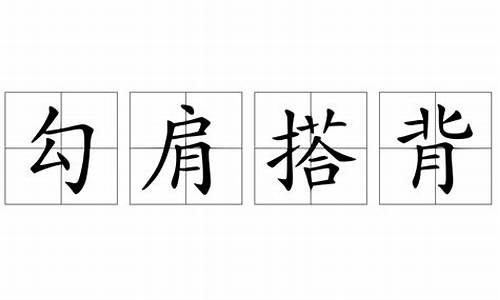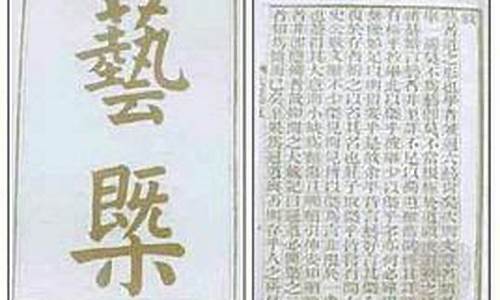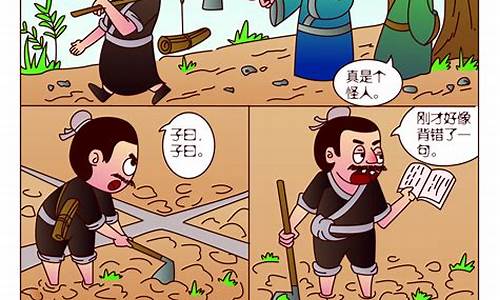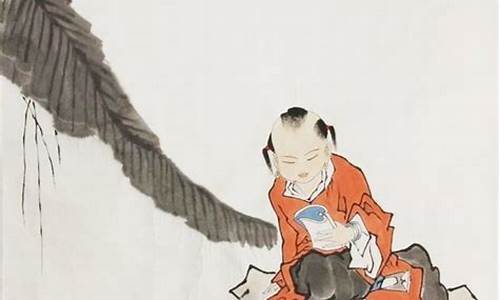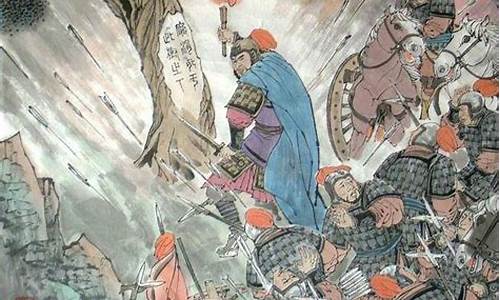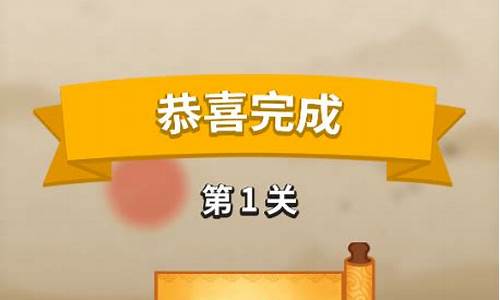英语成语故事简短
现在,请允许我来为大家分享一些关于英语成语故事简短的相关知识,希望我的回答可以给大家带来一些启发。关于英语成语故事简短的讨论,我们开始吧。
1.英语的成语故事
2.求四个字的成语故事英语的
3.谁有英语成语故事?~~~(中学水平)
4.成语故事 英文版
5.少儿英语成语故事:毛遂自荐
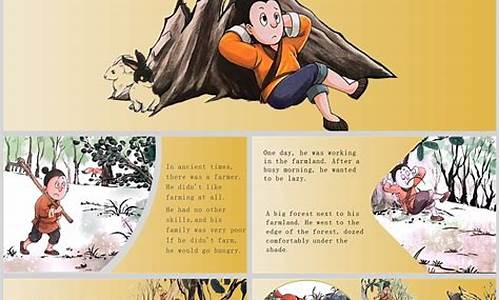
英语的成语故事
画蛇添足
An official of the ancient State of Chu awarded a pot of wine to his men after the ceremony of Spring Sacrifice. One man said, “We have only one pot of wine. It's not enough for all of us but sufficient for one. Let's determine who'll have the wine by drawing a snake on the ground. He who finishes first will have the wine.”
The others agreed. Very soon, one man finished his snake. He was about to drink the wine when he saw the others were still busy drawing. He said complacently,“How slowly you are! I still have enough time to add feet to my snke.” But before he finished the feet, another man finished his snke and grabbed the pot from him, saying,“Whoever has seen a snake with feet? Yours is not a snke. So the wine should be mine!” He drank the wine. The man adding the feet to the snake had to give in and could only regret his foolishness.
楚国有一个官员,在春天祭过了祖宗之后,便将一壶酒赏给他的办事人员喝。有人提议:“我们只有一壶酒,肯定不够我们大家喝的,一个人喝倒是绰绰有余。我们每人在地上画一条蛇,谁画得最快,就把这壶酒给他。” 大家都同意了。
有一个人很快就把蛇画好了。他正打算喝这壶酒时,看见别人都还忙着画呢。他就得意扬扬地说:“你们画得好慢呀,等我再画上几只脚吧!” 他的蛇脚还没画完,另一个人已经把蛇画好了。那人把酒壶夺了过去说:“有谁见过长脚的蛇?你画的不是蛇,这壶酒应该是我的了。”说罢,就喝起酒来。那个给蛇画脚的人没办法,只能懊悔自己的愚蠢。
一鸣惊人
In the Warring States Period, Duke Wei of Qi neglected state affairs, for the first three years of his reign, giving himself over to dissipation. One of his ministers, Chun Yukun who had a good sense of humour, said to him: 'There is a big bird which has neither taken wing nor sung for three years.' The duke answered, 'Once that bird starts to fly and sing, it will astonish the world.' The duke thereupon devoted himself to his duties and built his state up into a powerful one.
战国时代,齐威王即位后做了三年国君,只顾享乐,不理政事。有个善于说笑话的人叫淳于髡,一天对齐威王说:“城里有一只大鸟,三年不飞也不叫,你知道这是什么道理?”齐威王说:“这鸟不飞则罢,一飞就冲天;不鸣则罢,一鸣就惊人。”在淳于髡的激发下,齐威王开始治理国家,取得很大成绩,齐国的声威一直保持了几十年。
杞人忧天
In the Spring and Autumn Period, in the State of Qi there was a man who always let his imagination run away with him. One day he even worried that the sky would fall on his head. He was so worried that he could neither eat nor sleep. Later, someone persuaded him that his fears were Ground-less.
春秋时代,杞国有一个喜欢胡思乱想的人。一天,他竟然想到,天会塌下来,地会陷下去,自己到哪里去安身?这个人越想越害怕,整天愁眉苦脸,坐立不安,白天吃不下饭,晚上睡不着觉。后来有人耐心地开到他,他才放下了心。
精卫填海
Once upon a time, the youngest daughter of Emperor Yan, legendary ruler of primitive China, went boating on the Eastern Sea. While she was enjoying herself, a strong wind rose on the sea and her boat capsized. Just before she was buried by the surging waves, her spirit turned into a beautiful bird. As it flew over the roaring sea, it cried sadly in the sound "jinwei, jingwei". That was why people called it "Jingwei".
The bird lived on a mountain near the sea. It hated the sea so much that it decided to fill it up. Every day, it flew to and fro between the mountain and the sea, carrying in a twig or a pebble from the mountain and dropping it into the sea.
One day, the roaring sea said to Jingwei, "Poor little bird, stop doing that meaningless thing! You'll never fill me up." Jingwei replied, "I'll fill you up no doubt! I will, even if it'll take me thousands of years! I'll fight on until doomsday!"
The brave little bird kept carrying twigs and pebbles from the mountain to the Eastern Sea without taking a rest.
From this fable comes the idiom "The bird Jingwei trying to fill the sea". We use it to describe people who are firm and indomitable and will not stop until they reach their goal.
从前,炎帝(传说中中国原始社会的统治者)的小女儿在东海上划船。正当她划得高兴时,海面上突然升起一阵大风,把她的小船弄翻了。就在她要被汹涌的波浪吞 没时,她的灵魂变成了一只美丽的小鸟。它飞过那咆哮的海面,伤心的叫着"精卫,精卫"的声音。所以人们就叫她"精卫"。
精卫鸟住在靠海的一座山上。它非常恨大海,所以决心要把它填平。它每天来回于山海之间,把从山上衔来的小树枝和小石子扔在大海里。
一天,咆哮的大海对精卫说:"可怜的小鸟,停止你那无谓的举动吧!你是永远都填不平我的。" 精卫回答说:"我当然会把你填平的!即使这需要千千万万年的时间,我也一定会斗争到底,直到你的末日来临!"
这只勇敢的小鸟继续从山上衔来小树枝和小石子,扔到东海中,从未有片刻休息。
"精卫填海"这个成语就是由这个传说而来的,形容那些坚定不移,不屈不挠,不到目的决不罢休的人。
求四个字的成语故事英语的
画龙点睛。字面的意思是画龙之后再点上眼睛。这个成语多用于说话写作那么关于它的历史典故是怎样的呢?一起来看看吧:
Mr. Li is a good painter. One day he draws a beautiful dragon without eyes.
Mr. Zhou looks at the picture and says, “The dragon has no eyes. It isn’t a good picture.”
But Mr. Li smiles and says, “If I add eyes to the dragon, it will fly away.”
Mr. Zhou shakes head and says, “You are boasting. I don’t believe you.”
Mr. Li isn’t angry. He holds the paintbrush and adds eyes to the dragon. Woe! The dragon really flies.
李先生是位很好的画家。一天画了一条栩栩如生的龙,但是这只龙没有眼睛。
周先生见了说:“这条龙没有眼睛。这不算一张好画。”
可是李先生笑着说:“如果我给它加上眼睛,它就会飞走了。”
周先生摇头说:“你吹牛。我不相信。”
李先生也不生气,只是拿起笔给龙点上眼睛。哇!龙真的飞走了。
谁有英语成语故事?~~~(中学水平)
英语故事:破镜重圆
A Broken Mirror Joined Together
This set phrase metaphorically means the reunion of husband and wife after an enforced separation or a rupture.
At the end of Southern Dynasties,when the Chen Dynasty was about to be overthrown.
Xú Déyán felt very worried.He foreknew that his wife Princess Lè Chāng was destined to separate from him.
His wife is the last Emperor Chén Shūbǎo's younger sister.
Hence he broke a round bronze mirror into halves.
One half is given to the Princess,the other half left with himself.
The couple agreed on it that the wife would pretend to sell the broked mirror in the street of Cháng'ān,the capital of the Suí Dynasty,on the Lantern Festival.
After the fall of Chén Dynasty,Princess Lè Chāng was captured and sent to Chang'an and forced to be a concubine-servant in the mansion of Yáng Sù.
Xú Déyán missed his wife very much and went to the captial to look for her.
On the 15th day of the first lunar month,he found a man selling half the mirror.
After asking the man,he knew that his wife had been a concubine-servant of Yáng Sù. Thinking that he could not see her again,he sighed a great sorrow.
Having known the matter,Yáng Sù felt much sympathy for the couple.He sent for Xú Déyán and told him to take wife away.Thus the husband and the wife were reunited into a happy couple.
成语故事 英文版
守株待兔
春秋时代,宋国有个农夫,一天在耕田的时候,忽然跑来一只兔子,恰好碰在树桩上,脖子折断死了。农夫把兔子拾回家去,美美地吃了一顿兔肉。晚上他想:“我何必辛辛苦苦的种地呢?每天在树下能捡到一只兔子就够我吃的了。”于是他从此不再耕种,每天坐在树下等待兔子的到来。
这个成语,讥笑那些不想经过努力,存在侥幸心理,希望得到意外收获的人。
Sitting by a Stump, Waiting for a Careless Hare
In the Spring and Autumn Period, a former in the state of Song was one day working in the fields when he saw a rabbit bump into a tree stump accidentually and break its neck. The former took the rabbit home and cooked himself a delicious meal. That night he thought:"I neednt work so hard. All I have to do is wait for a rabbit each day by the stump." So from then on he gave up farming, and simply sat by the stump waiting for the rabbits to come and run into it.
This idiom satirizes those who just wait for a stroke of luck, rather than making efforts to obtain what they need.
少儿英语成语故事:毛遂自荐
掩耳盗铃Plugging One's Ears While Stealing a Bell
春秋时侯,晋国贵族智伯灭掉了范氏。有人趁机跑到范氏家里想偷点东西,看见院子里吊着一口大钟。钟是用上等青铜铸成的,造型和图案都很精美。小偷心里高兴极了,想把这口精美的大钟背回自已家去。可是钟又大又重,怎么也挪不动。他想来想去,只有一个办法,那就是把钟敲碎,然后再分别搬回家。
小偷找来一把大大锤,拼命朝钟砸去,咣的一声巨响,把他吓了一大跳。小偷着慌,心想这下糟了,这种声不就等于是告诉人们我正在这里偷钟吗?他心里一急,身子一下子扑到了钟上,张开双臂想捂住钟声,可钟声又怎么捂得住呢!钟声依然悠悠地传向远方。
他越听越害怕,不同自由地抽回双手,使劲捂住自已的耳朵。“咦,钟声变小了,听不见了!”小偷高兴起来,“妙极了!把耳朵捂住不住就听不进钟声了吗!”他立刻找来两个布团,把耳朵塞住,心想,这下谁也听不见钟声了。于是就放手砸起钟来,一下一下,钟声响亮地传到很远的地方。人们听到钟声蜂拥而至把小偷捉住了。
故事出自《吕氏春秋?6?1自知》“掩耳盗钟”被说成“掩耳盗铃”,比喻愚蠢自欺的掩饰行为。
Plugging One's Ears While Stealing a Bell
During the Spring and Autumn period,Zhi Bo of the State of Jin destroyed Fan's family.Taking advantage of this occasion,a man went to Fan's house and tried to steal something.As soon as the man entered the gate,he saw that there hung a big bell in the courtyard.The bell was cast in high-quality bronza,and was beautiful in design and shape.The theif was very glad,and decided to carry this beautiful bell back home.But no matter how hard he tried,he could not move the bell,because the bell was both big and heavy.He thought and thought again,and believed there was only one way to solve the problem.He had to break the bell to pieces before he was able to carry them back to his home separately.
The thief found a big iron hammer,with which he struck the bell with all his might.The striking produced an enormous crashing sound,which might.The striking produced an enormous crashing sound,which made the thief terribly frightened.The thief got flurried,thinking that it was too bad to have produced the crashiing sound which would himself on the bell,trying to muffle the crashing sound with his arms.But how could the crashing sound of the bell be muffled?The crashing sound still kept drifting melodiously to distant places.The more he listened to the sound,the more frightened hw became.He xubconsciously shrank back,and covered his ears hard with his hands."Hey,the sound becomes fainter,inaudible,"the thief became cheerful at once," wonderful!The sound of the bell can not be heard when the ears are covered."He immediately got some odd bits of cloth,made two rolls with them,and had his ears plugged with the two cloth rolls.He thought that in this way nobody could hear the sound of the bell.Feeling relieved,he began striking the bell,one blow after another.The resounding sound of the bell was heard at distant places,and finally people caught the thief by gracing the sound.
This story comes from"Knowing Yourself" in The Annals by Buwei,written just before the Qin Dynasty(221-207 B.C.)was founded.Allegedly,when Li Yuan,Emperor Gao Zu of the Tang Dynasty(618-907),read this story,he felt it simply ridiculous and said,"This is what is called plugging one's ears while stealing a bell."
Later,people have used the set phrase "plugging one's ears while stealing a bell" to refer to the ignorance and foolishness of the person who deceives himself as well as others.
volunteer to do sth/recommend oneself毛遂自荐
In the Warring States Period, the State of Qin besieged the capital of the State of Zhao.战国时代,秦国军队攻打赵国的都城。
Duke Pingyuan of Zhao planned to ask the ruler of the State of Chu personally for assistance.He wanted to select a capable man to go with him. 赵国的平原君打算亲自到楚国去请救兵,想挑选一个精明能干的人一同前去。
A man called Mao Sui volunteered. 有一个名叫毛遂的人,自告奋勇愿意同去。
When the negotiactions between the two states were stalled because the ruler of Chu hesitated to send troops, Mao Sui approached him, brandishing a sword. At that, the ruler of Chu agreed to help Zhao, against Qin.平原君到楚国后,与楚王谈了半天,没有一点结果。毛遂怒气冲冲地拿着宝剑,逼近楚王,终于迫使楚王答应出兵,与赵国联合共同抵抗秦国。
This idiom means to recommend oneself.“毛遂自荐”这个成语用来比喻自己推荐自己,不必别人介绍。
文化链接
英文中“毛遂自荐”可以说成“volunteer to do sth”,“volunteer”既可以作名词,也可以作动词,作名词时的意思是“志愿者”,作动词就可以解释为“志愿去做什么事”,就是“毛遂自荐”啦~
我们来一起看几个例句吧~
Our company volunteered to support and help the victims. 我们的公司毛遂自荐来帮助受灾灾民。
You can volunteer to work one or multiple shifts。你可以毛遂自荐做单班制,也可以选择多班制。
今天的讨论已经涵盖了“英语成语故事简短”的各个方面。我希望您能够从中获得所需的信息,并利用这些知识在将来的学习和生活中取得更好的成果。如果您有任何问题或需要进一步的讨论,请随时告诉我。
声明:本站所有文章资源内容,如无特殊说明或标注,均为采集网络资源。如若本站内容侵犯了原著者的合法权益,可联系本站删除。

